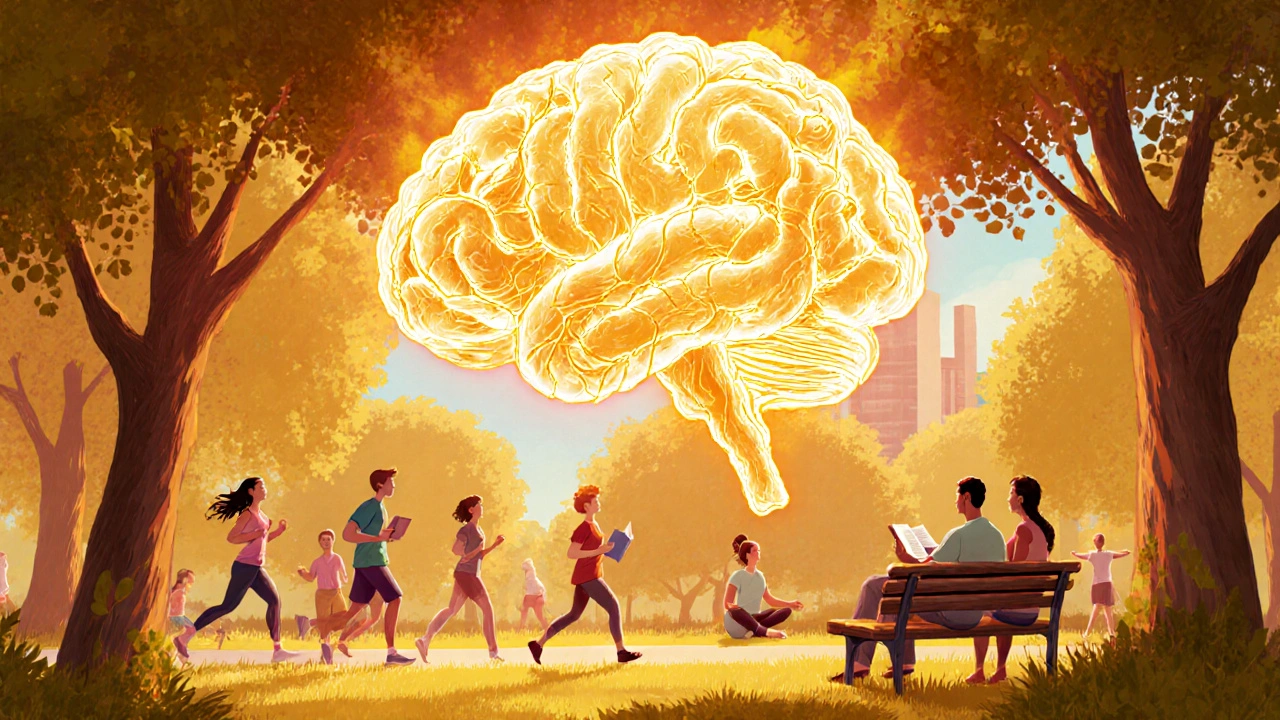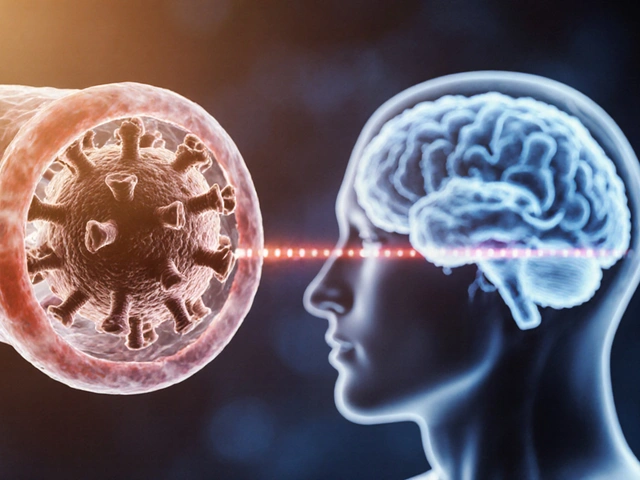Hepatitis C & Memory Loss: Symptom Checker
Memory Symptoms
These are common memory-related issues associated with Hepatitis C.
- Trouble remembering names
- Misplacing objects frequently
- Feeling "foggy" during the day
- Difficulty concentrating
- Slower mental processing speed
Cognitive Symptoms
Additional cognitive effects that may accompany memory issues.
- Mental confusion after high-fat meals
- Mood swings or irritability
- Mild depression
- Reduced ability to multitask
- Problems with decision-making
Assessment Tool
Rate how often you experience each symptom on a scale of 1-5 (1 = never, 5 = constantly):
Your Symptom Assessment Results
Memory Score
Score: 0/25
Cognitive Impact
Score: 0/25
Recommendation
Please complete the assessment to see personalized recommendations.
What This Means:
- Low scores (0-5): Mild or no symptoms likely related to Hepatitis C
- Moderate scores (6-15): Possible cognitive effects; consider discussing with your doctor
- High scores (16-25): Significant symptoms; consult your healthcare provider promptly
About Hepatitis C and Memory
Hepatitis C can affect memory and cognitive function through several mechanisms:
- Neuroinflammation caused by cytokines
- Direct viral effects on brain cells
- Liver-brain axis disruption leading to toxin buildup
Modern treatments with direct-acting antivirals (DAAs) often improve cognitive symptoms after treatment completion.
When you hear the term Hepatitis C, the first thing that often comes to mind is liver damage. Yet a growing body of research shows the virus can also mess with your brain, leading to memory lapses and other cognitive quirks. If you or someone you love is living with Hepatitis C, understanding this hidden side‑effect is crucial for getting the right care.
Key Takeaways
- Hepatitis C can cause memory loss through direct viral effects and inflammation.
- Memory problems are part of the virus’s extra‑hepatic manifestations and may appear even when liver function seems stable.
- Modern direct‑acting antivirals (DAAs) often improve cognitive symptoms, but the recovery timeline varies.
- Regular brain assessments, lifestyle tweaks, and targeted therapies can help preserve memory.
- Talk to your healthcare team about any new forgetfulness - early detection makes a big difference.
How Hepatitis C Affects the Brain
Hepatitis C is a viral infection that primarily attacks the liver, but the virus doesn’t stay confined there. About 40‑60% of people with chronic infection develop what doctors call extra‑hepatic manifestations, a range of symptoms that arise outside the liver. Among these, cognitive changes - especially memory loss - have drawn increasing attention in the last decade.
The brain‑liver connection runs through the bloodstream. Hepatitis C can cross the blood‑brain barrier, either as whole viral particles or via inflammatory messengers. Once inside, the virus can trigger neuroinflammation, alter neurotransmitter balance, and even damage white‑matter tracts that support memory processing.

Symptoms: Memory Loss and Other Cognitive Signs
People often report having trouble remembering names, misplacing objects, or feeling “foggy” during the day. While occasional forgetfulness is normal, Hepatitis C‑related memory loss tends to be more persistent and may coexist with these additional signs:
- Difficulty concentrating on tasks that require sustained attention.
- Slower mental processing speed - you might need extra time to finish reading or solving problems.
- Episodes of mental confusion, especially after meals that are high in fat.
- Mood swings, irritability, or mild depression that can further cloud thinking.
If you notice a pattern of these issues, it’s worth flagging them for your doctor. Cognitive symptoms can appear at any stage of liver disease, even when blood tests show stable liver enzymes.
Why Memory Problems Occur: The Science
The exact mechanisms are still being pieced together, but three major pathways dominate current explanations.
- Neuroinflammation: Hepatitis C triggers the release of cytokines like interleukin‑6 (IL‑6) and tumor necrosis factor‑alpha (TNF‑α). These inflammatory proteins travel to the brain, where they disrupt synaptic plasticity - the ability of neurons to strengthen connections, a key process for forming new memories. Studies have shown elevated IL‑6 levels correlate with poorer performance on memory tests in infected patients.
- Direct viral neurotoxicity: Some imaging studies using brain MRI have detected subtle changes in the basal ganglia and hippocampus of Hepatitis C patients, regions critical for memory consolidation. The theory is that viral RNA inside brain cells interferes with normal cellular metabolism, leading to neuronal loss over time.
- Liver‑brain axis disruption: Chronic liver disease can lead to accumulation of ammonia and other toxins that the liver normally clears. Even mild elevations can affect cerebral function, a condition sometimes called “minimal hepatic encephalopathy.” While traditionally linked to cirrhosis, even early‑stage fibrosis can raise toxin levels enough to impair cognition.
These pathways often overlap, creating a feedback loop where inflammation worsens toxin buildup, which in turn fuels more inflammation.
Diagnosing Cognitive Issues in Hepatitis C Patients
Because memory loss can stem from many causes - stress, medication side‑effects, sleep problems - a systematic approach is essential.
- Clinical interview: Your provider will ask about the onset, frequency, and severity of forgetfulness, as well as any mood changes.
- Neuropsychological testing: Brief screening tools like the Montreal Cognitive Assessment (MoCA) or more detailed battery tests can quantify memory deficits and differentiate them from general fatigue.
- Blood work: Labs will check liver function (ALT, AST), viral load, ammonia levels, and inflammatory markers to gauge the systemic impact of the infection.
- Imaging: While not always required, a brain MRI can reveal white‑matter hyperintensities or subtle hippocampal atrophy that support a neuroinflammatory diagnosis.
- Medication review: Some older Hepatitis C treatments, especially interferon‑based regimens, were notorious for causing mood swings and memory issues. Checking current prescriptions ensures you’re not attributing a drug side‑effect to the virus itself.
Putting these pieces together helps clinicians decide whether the memory loss is likely linked to Hepatitis C or another underlying condition.

Treatment Options that May Improve Memory
The biggest breakthrough in the past ten years has been the advent of direct‑acting antivirals (DAAs). These pills target specific steps in the viral life‑cycle, achieving cure rates above 95% with minimal side‑effects.
Evidence from multiple cohort studies shows that patients who achieve a sustained virologic response (SVR) - essentially a cure - often report noticeable improvements in cognition within 3‑6months. The reasons are two‑fold: clearing the virus reduces neuroinflammation, and liver function often stabilizes, lowering toxin levels.
For those who cannot receive DAAs due to contraindications, older therapies like interferon therapy may still be used, but they carry a higher risk of worsening memory and mood. In such cases, adjunctive treatments can help:
- Anti‑inflammatory agents: Low‑dose aspirin or omega‑3 fatty acids have shown modest benefits in reducing cytokine‑driven brain inflammation.
- Cognitive rehabilitation: Structured memory exercises, brain‑training apps, and occupational therapy can strengthen neural pathways that have been weakened.
- Ammonia‑lowering strategies: Rifaximin or lactulose, traditionally used for hepatic encephalopathy, may aid patients with persistent toxin buildup, even if they don’t have full‑blown encephalopathy.
It’s important to discuss any supplement or medication change with your hepatologist or infectious disease specialist to avoid drug interactions.
Lifestyle Steps to Support Brain Health
Medication and medical care are only part of the puzzle. Everyday habits can either protect or erode memory function.
| Condition | Typical Memory Impact | Key Contributing Factors |
|---|---|---|
| Hepatitis C | Moderate, often reversible after cure | Neuroinflammation, direct viral presence, mild toxin buildup |
| Alcohol‑Related Liver Disease | Severe, may persist despite abstinence | High ammonia, nutritional deficits, chronic brain injury |
| Non‑alcoholic Fatty Liver Disease (NAFLD) | Variable, usually mild | Metabolic syndrome, insulin resistance, low‑grade inflammation |
Beyond the table, consider these practical steps:
- Sleep hygiene: Aim for 7‑9hours of quality sleep. Deep sleep is when the brain clears waste products, including the very toxins that can impair memory.
- Balanced diet: Foods rich in antioxidants (berries, leafy greens) and omega‑3s (fatty fish, flaxseed) help combat inflammation.
- Regular exercise: Moderate aerobic activity boosts blood flow to the hippocampus, supporting neurogenesis - the birth of new brain cells.
- Limit alcohol: Even small amounts can compound liver stress and neurotoxicity.
- Stay mentally active: Reading, puzzles, or learning a new skill keeps neural circuits engaged.
Adopting these habits early, especially while undergoing antiviral treatment, maximizes the odds that your memory will bounce back.
Frequently Asked Questions
Can Hepatitis C cause permanent memory loss?
Most memory issues linked to Hepatitis C are at least partially reversible once the virus is cleared with DAAs. However, if the infection has led to severe liver damage or prolonged neuroinflammation, some deficits may linger. Early treatment dramatically improves the chance of full recovery.
Do I need a brain MRI to prove my memory loss is from Hepatitis C?
A brain MRI isn’t mandatory for every patient, but it can be useful when symptoms are pronounced or other neurological conditions are suspected. The scan helps rule out alternative causes and can reveal the subtle changes associated with viral neuroinflammation.
How long after finishing antiviral therapy might I see memory improvements?
Most people notice a gradual lift in cognition within 3 to 6months after achieving SVR. Some report earlier gains, especially in concentration, while memory consolidation may take a bit longer as the brain clears lingering inflammation.
Are there any supplements proven to help memory in Hepatitis C?
Omega‑3 fatty acids and B‑complex vitamins have modest evidence for supporting brain health in inflammatory conditions. They should be taken alongside, not instead of, antiviral therapy and after discussing with your doctor.
Should I be worried about my children’s risk of memory problems if I have Hepatitis C?
Hepatitis C is not hereditary. The virus spreads through blood contact, not genetics, so children of infected parents are not at higher risk for memory loss unless they become infected themselves.


Hannah Tran
October 10, 2025 AT 18:39Hey folks, let's cut to the chase: Hepatitis C isn’t just a liver issue-it can trigger neuroinflammation, cytokine storms, and even direct viral intrusion into the central nervous system, which translates to that dreaded brain fog and memory lapses. If you’re noticing trouble recalling names or misplacing your keys, it’s not just “being absent‑minded,” it could be a sign of hepatic encephalopathy in disguise. Modern DAAs (direct‑acting antivirals) have revolutionized treatment, often clearing the virus and alleviating cognitive symptoms within weeks. However, you shouldn’t wait for the magic pill to fix everything-schedule a neurocognitive assessment early and keep a symptom diary. And remember, staying aggressive about your health outcomes means demanding comprehensive care from your provider, not settling for vague reassurance. Stay vigilant, stay educated, and fight that virus on every front.
Dhananjay Sampath
October 22, 2025 AT 13:19Friends, remember, if you’re experiencing any of the listed memory or cognitive symptoms, it’s crucial, absolutely essential, to cross‑reference your daily habits, your medication schedule, and your nutritional intake, especially high‑fat meals that can exacerbate hepatic‑brain axis disturbances; also, keep track of mood swings, irritability, and even mild depression, because these can be early warning flags that your liver’s detox pathways are overloaded, leading to toxin buildup that impairs neuronal function. Don’t ignore these signals, and don’t assume they’ll just go away on their own.
kunal ember
November 3, 2025 AT 06:59It is worth noting, first and foremost, that the relationship between hepatitis C and cognitive decline is underpinned by a complex interplay of virological, immunological, and metabolic factors; the virus, being an RNA virus, can produce persistent low‑grade inflammation, which in turn releases pro‑inflammatory cytokines like IL‑6 and TNF‑α that have been shown to cross the blood‑brain barrier, thereby affecting neuronal signaling pathways. Moreover, chronic infection often leads to hepatic dysfunction, impairing the organ’s ability to detoxify ammonia and other neurotoxic metabolites, a condition clinically referred to as hepatic encephalopathy, which can manifest in subtle memory deficits before progressing to overt confusion. Research indicates that direct‑acting antivirals (DAAs) not only eradicate the viral load but also reduce systemic inflammation, offering a potential reversal of some of these neurocognitive symptoms, though the timeline for recovery can vary considerably among individuals. Patients should be encouraged to undergo baseline neuropsychological testing prior to initiating therapy to establish a reference point for any subsequent improvement or deterioration. Additionally, lifestyle modifications-such as reducing dietary fat intake, avoiding alcohol, and maintaining regular physical activity-can synergistically support liver health and, by extension, cognitive function. It is also crucial to differentiate between medication side‑effects and disease‑related symptoms; some ribavirin‑containing regimens historically caused fatigue and mood changes, which could be misattributed to the virus itself. While the literature is still evolving, a growing body of evidence suggests that successful viral clearance is associated with decreased rates of depression and anxiety, further underscoring the mind‑body connection inherent in chronic hepatitis C. In clinical practice, a multidisciplinary approach involving hepatologists, neurologists, and mental health professionals yields the most comprehensive care for patients navigating these intertwined challenges. Finally, patients should be reminded that the brain’s plasticity allows for compensatory mechanisms, meaning that early intervention can result in meaningful functional recovery, even after prolonged periods of cognitive strain. Thus, optimism is warranted, provided that patients remain proactive, adhere to treatment protocols, and engage in supportive self‑care routines.
Kelly Aparecida Bhering da Silva
November 15, 2025 AT 01:39Let me be perfectly clear: the big pharma lobby has been downplaying the cognitive fallout of Hepatitis C for years, pushing sleek marketing about “miracle cures” while ignoring the fact that many patients still report persistent brain fog even after clearance. This isn’t a coincidence; it’s a deliberate diversion, funded by billions in clandestine campaign contributions. If you want true recovery, demand independent, peer‑reviewed studies and push for transparency, because trusting the mainstream narrative without question is a recipe for complacency and continued health exploitation.
Michelle Dela Merced
November 26, 2025 AT 20:19OMG, this article is a total roller‑coaster! 🎢 I’m literally shaking my head at how many people overlook *brain fog* just because they think HCV is only about the liver. Like, seriously, why are we so blind? 😱
Mark Wellman
December 8, 2025 AT 14:59Ugh, another so‑called "expert" piece. I mean, sure, the virus does stuff, but honestly who cares if you forget where you put your coffee? Life's short, just chill and don’t overthink the meds, lol.
Beverly Pace
December 20, 2025 AT 09:39Ignoring cognitive decline in HCV patients is ethically unacceptable.
RALPH O'NEIL
January 1, 2026 AT 04:19From a practical standpoint, it’s important to monitor any changes in memory or concentration when you have Hepatitis C. Even if the symptoms seem mild, they can affect daily tasks, work performance, and overall quality of life. Keeping a journal of episodes can help your healthcare provider pinpoint patterns and decide whether additional evaluation or treatment adjustments are needed.
Amy Morris
January 12, 2026 AT 22:59Absolutely, tracking those subtle lapses can be a game‑changer! Imagine realizing that those tiny “forgot‑the‑milk” moments are actually whispering warnings from your brain-then you can act before they become a full‑blown crisis. It’s like reading the fine print of your own health, and it’s both empowering and, frankly, a little dramatic, but hey, that’s how we stay ahead of the curve.
Francesca Roberts
January 24, 2026 AT 17:39Oh great, another “essential facts” list-because we clearly didn’t have enough of those. I’m sure the next line will say “consult your doctor” as if that’s a revolutionary insight. 🙄